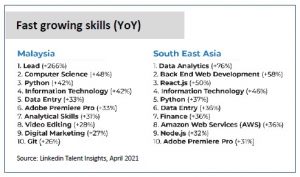MDEC: Digital Job Vacancies Almost Tripled in Malaysia
Dr Sumitra Nair
Vice President & Head of Digital Skills and Jobs
Malaysia Digital Economy Corporation (MDEC)
Dr Sumitra Nair was the session moderator for a PIKOM-MASSA webinar on Human Capital held on 14 April 2021. Building on the momentum and insights gained from the webinar, MASSA invited Dr Sumitra to pen her insights for the August edition of MASSA ‘s Newsletter.
Based on Malaysia Digital Economy Corporation’s (MDEC) tracking of digital vacancies on five popular recruitment platforms in Malaysia since June 2020, digital job vacancies in Malaysia almost tripled from June 2020 to April 2021. This can be attributed to the extended impact from the Covid-19 pandemic which has shown that the role of digitalisation is extremely vital for the survival of businesses. This trend is not exclusive only in Malaysia but is a global phenomenon.
MDEC has found that the number of digital job vacancies increased from around 19,000 in June last year to more than 56,000 vacancies as at April 2021, with the largest share of vacancies posted on LinkedIn. The most popular jobs posted were in Software Development, Data Science, IT Services and eCommerce. 76 percent of the vacancies were for experienced hires, 20 percent of vacancies open to fresh graduates and rest being for internships.
Based on data extracted from the LinkedIn Talent Insights (LTI) platform, skills highest in demand in Malaysia as well as the South East Asian region include analytical skills, software development, various programming languages and cloud computing.
As more non-tech industries embrace digitalisation, companies in market research, cosmetics, music and tobacco have been actively hiring digital talents over the past year. At the same time, the information communications technology and financial services sectors are struggling to meet the strong demand for digital talents in their respective sectors.
The findings below are based on MDEC’s Digital Skills and Jobs Division analysis of data derived from the LinkedIn Talent Insights (LTI) platform in April 2021. MDEC’s research had involved more than 960 digital roles across all industries in Malaysia and the South East Asian region.
Digital Talents
As of April 2021, there has been more than 240,000 digital talents in Malaysia that have LinkedIn profiles and more than half of them are located in Selangor or Kuala Lumpur. Outside the usual hotspots, a surplus of digital talents can also be found in Johor, Penang and Malacca, most likely due to the presence of universities like Universiti Teknologi Malaysia, University Sains Malaysia and Multimedia University in those states. Employers who are in dire need for digital talents may want to run their recruitment drives in those states.
The most popular job titles amongst digital talents in Malaysia include Digital Marketing Executive/Specialist/Manager, Data Scientist, Full Stack or Software Engineer, Head of Digital and interestingly, YouTuber. Data from LTI also suggest that over the last one year, there has been a 20 to 30 percent growth in the number of talents that are either self-employed, working as freelancers or YouTubers. This increasing trend of self-employed or freelancers bodes well with the government’s growing focus on the gig economy and workers. This includes MDEC’s Global Online Workforce (GLOW) Penjana programme which trained more than 10,000 unemployed Malaysians on how to secure freelance jobs via online platforms.
MDEC’s GLOW is a national programme designed to enable Malaysians to become part of the online global workforce and to earn income independently and it is inclusive for Malaysians from various walks of life. This programme involves stakeholders from various public and private sectors and will train and provide mentoring to registrants in a very methodological and cohesive manner. Please click on this link https://mdec.my/glowmalaysia/ for more information and follow MDEC’s social media for the announcement of the next GLOW intake.
Skill sets of Digital Talents
In Malaysia, fast growing digital skills includes Computer Science, Information Technology, Python and Adobe Premier Pro which has shown consistent growth of more than 30 percent in the past year. Phyton is one of the foundational skills for data science careers which may explain the spike in this skill. Fast-growing skills in Malaysia are somewhat different from the South East Asian region.
For example, there’s been much steeper growth in data analytics, back-end web development and React.js skills in the region compared to the other types of popular skills in Malaysia. Since the skills that are in demand in Malaysia include Cloud Computing and a variety of programming languages, digital talents who wish to enhance their marketability would do well to pick up skills that are fast growing in our neighbouring countries.
Significance of Current Digital Talents Trends for Malaysian Talents
While the number of digital job vacancies is high, the majority of the vacancies are for experienced talent. This poses a challenge to fresh graduates. In the short term, fresh graduates could close their experience gap by taking up digital jobs on freelance basis via platforms like Upwork, Freelancer.com or Fiverr. At the same time, junior level talents should also start to pick up some of the in-demand digital skills like analytical skills, software development, various programming languages and cloud computing.
To help talents identify the right training courses, MDEC has established the Digital Skills Training Directory which lists courses that have been reviewed and endorsed by expert tech practitioners. Job seekers would do well to refer to this directory, while those who are employed can also enhance their careers by taking up courses to acquire some of the in-demand skills mentioned in this article. For more information on MDEC’s Digital Skills Training Directory, please click on the following link: https://mdec.my/digitalskillstrainingdirectory/.
As for secondary school leavers or pre-university students who are wondering what courses to pursue in university, these trends suggest promising career opportunities in digital technology-related disciplines. In this regard, MDEC works with 11 universities and five Polytechnics as part of our Premier Digital Tech Institutions initiative. Thanks to the strong collaboration between these institutions and industry players, more than 90 percent of their digital tech graduates get employed within six months of graduation.
MDEC has shown continuous support towards optimising and grooming the potential of Malaysia’s digital talent. Generating income through digital means is not confined only by working for digital processing companies and IT start-ups, because thanks to MDEC’s efforts, it is now much more inclusive and accessible. Malaysians looking to kickstart their online business platforms and networks are welcomed to learn about MDEC’s various initiatives towards going digital at https://mdec.my/.
For more articles written by Dr Sumitra Nair, please click on the following link: https://blog.mdec.my/?cat=27




